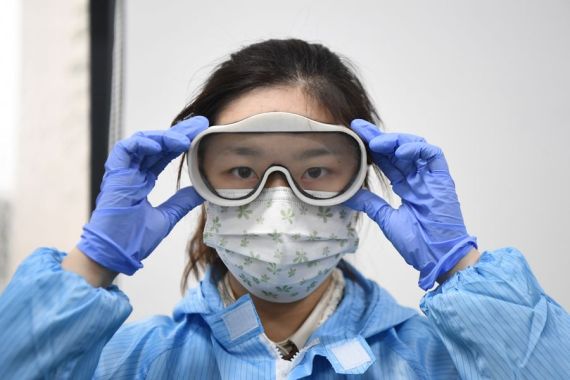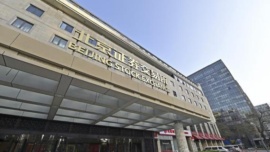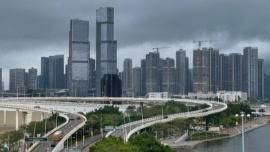China adopted tougher measures to contain the spread of the Coronavirus in the past week.
First and foremost, President Xi Jinping mobilized the military to transport the medical supplies necessary for hospital staff members, including doctors and nurses. Some reports pointed to the fact that some citizens in Wuhan grasped whatever medical supplies they could get.
As such, sending the People’s Liberation Army (PLA) to transport the medical equipment and necessities would ensure the safe and smooth logistical supplies to various hospitals.
Second, a military expert in biochemical warfare, Chen Wei, was dispatched to take over a P4 laboratory in Wuhan. The P4 laboratory was a place where viruses were tested and experimented. Some foreign observers suspected that the outbreak of the Coronavirus might have originated from a leakage of this laboratory. There is no concrete evidence to prove this claim.
Yet, some mainland netizens criticized the management of this laboratory, questioning the capability of a few researchers. Interestingly, the takeover of the laboratory by the military and biochemical expert showed that it was regarded as a highly sensitive place with tremendous implications for national security and public health.
If any virus may infiltrate any laboratory staff, the situation would become highly dangerous because viruses can mutate further.
Third, unconfirmed rumours circulated by the overseas Chinese media claimed that some PLA officers were infected in various places, and that North Korea found two infected cases of infections.
In any case, tough quarantine measures had to be imposed on all the PLA officers, including the army, navy and air force. Any penetration of the Coronavirus into the military would endanger national security. Hence, the PLA in entire China is on high alert, while it has to assist the Chinese Communist Party to contain the spread of the disease efficiently and effectively.
Fourth, some Hubei and Wuhan officials continued to be removed, demonstrating the deep dissatisfaction of the leaders of the central government with them. The Shanghai city mayor Ying Yong was sent to be the party secretary of Hubei province, while Jinan city party secretary Wang Zhonglin was designated to be the party secretary of Wuhan city.
These personnel appointments showed Beijing;s determination to send the experienced city officials, especially Ying who has rich experiences, to enforce strict quarantine measures in the entire province and Wuhan city. The mainland system of official accountability system shows that, once party cadres and officials are deemed to be unsatisfactory in their performance, they must be removed, dismissed or even demoted immediately.
Fifth, because the Wuhan Red Cross leaders and staff members were criticized by some netizens as showing mismanagement and implementation gaps in delivering logistical supplies to hospitals, the Red Cross from the Beijing headquarters sent a work team led by party secretary and deputy chair, Liang Weiling, to look into the situation in Wuhan.
Liang made sure that the Red Cross officials at the city and provincial levels can and will deliver logistical supplies to hospitals that are really in need of urgent equipment and materials. An open platform was opened in the Internet to allow citizens to report any misuse or mishandling of logistical supplies to the Red Cross in Wuhan.
Other staff members of Red Cross from Jiangsu and Sichuan were dispatched to help their colleagues in Wuhan city. Again, the mobilization of the Red Cross and its central leadership’s intervention in Wuhan could be seen.
Sixth, the city of Wuhan has undergone a massive process of sterilization. Vehicles armed with sterilization agents were sent to clean up all the buildings, streets and roads, trying to ensure that the virus could not spread further.
It is unknown whether this sterilization campaign can stem the spread of the virus, but all-out efforts to contain the disease have illustrated the mobilizational capability of the city and provincial government staff, including the neighbourhood and street-level committees.
Seventh, the death of a doctor, Li Wenliang, on February 7 sparked the anger of some netizens, who openly demanded in the Internet that those officials who mismanaged Wuhan and who warned Li of his whistleblowing action should be punished.
In response, the central authorities went to investigate the officials who had warned Li and asked them to apologize to the citizens. Moreover, 300 officials from the propaganda department from Beijing were sent to Wuhan, apparently responsible for the good publicity of the war against Coronavirus. Some angry netizens demanded that the Wuhan and Hubei leadership should be removed.
As mentioned above, the central government sent the party secretaries from Shanghai and Jinan to replace the problematic leaders in Wuhan and Hubei, thereby trying to appease the anger of netizens. The way in which the central government reacted to the death of Li Wenliang showed that it was determined to revamp the political leadership in Wuhan and Hubei, whose performance legitimacy rapidly deteriorated in the eyes of many netizens and citizens.
Eighth, President Xi Jinping demonstrated his leadership by holding a meeting of the Standing Committee of the Politburo on February 12, two days after his inspection on how the containment work on the Coronavirus was conducted at both the central and provincial levels. Xi, according to the mainland media, stressed the paramount importance of the public health and safety of citizens.
He also remarked that the first line of defence lies with the party work to contain the spread of the disease. Xi mentioned the dual needs of utilizing not only science to control the Coronavirus but also law in imposing quarantine measures and ensuring the law and order of China.
He instructed the party cadres to work with the citizens, to be responsible, and to take the challenges of containing the virus without shirking their responsibility. Xi finally told the military to shoulder the responsibility of assisting all the provinces and cities to fight against the Coronavirus, to mobilize military hospitals and medical staff in the current campaign, and to protect themselves while helping all others.
Ninth, one interesting remark made by President Xi was that he hoped the work against the Coronavirus should not go too far as to affect the stable process of economic production.
He appeared to express his concern about whether some quarantine measures might be so stringent that economic production was already affected seriously, thereby hurting the Chinese economic performance and growth. Indeed, Xi’s Chinese dream and renaissance are now hampered by the outbreak of the Coronavirus.
His remarks of moderation in the approach to fight the virus illustrated his dilemma of trying to push China to be an economic giant on the one hand and to control the Coronavirus quickly on the other.
Finally, Vice Premier Sun Chunlan went to Wuhan in the capacity as the deputy chair of the task force dealing with the Coronavirus, pushing for stricter quarantine measures in all places.
She asked all hospitals to admit more patients, appealed to the construction of more makeshift hospitals, and emphasized the need to transform the provincial and municipal party schools and college dormitories into quarantine sites.
However, a few netizens criticized her proposed measures for havingthe unintended consequence of increasing the number of infected people, because the hospital staff members do not have sufficiently self-protective supplies and equipment.
Clearly, a tripod composed of the party, the military and the government at both central and local levels has been going all out to contain the spread of the Coronavirus. But given the rapidly spreading disease and the increasing number of infected citizens, it will take many months for China to fight and win this critical war against the Coronavirus.
MNA political commentator























